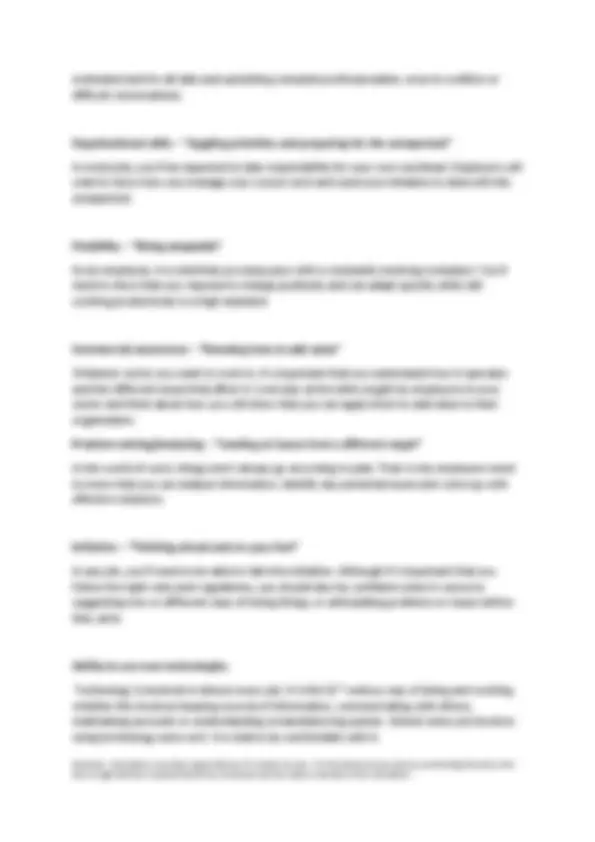




Study with the several resources on Docsity

Earn points by helping other students or get them with a premium plan


Prepare for your exams
Study with the several resources on Docsity

Earn points to download
Earn points by helping other students or get them with a premium plan
Community
Ask the community for help and clear up your study doubts
Discover the best universities in your country according to Docsity users
Free resources
Download our free guides on studying techniques, anxiety management strategies, and thesis advice from Docsity tutors
Insights into the concept of employability and its significance in today's job market. Employability goes beyond having the necessary subject skills and knowledge; it also encompasses personal attributes and general life skills. The importance of career ownership, continuous learning, and adaptability in securing and maintaining employment. Additionally, it outlines the top 12 employability skills that employers look for in graduates, including communication, teamwork, professionalism, and problem-solving.
Typology: Exercises
1 / 4

This page cannot be seen from the preview
Don't miss anything!



Disclaimer: Information is provided in good faith by CIT’s Careers Service. CIT, the Careers Service, and any contributing third party shall
employment, and obtain new employment if required.
In simple terms, employability is about being capable of getting and keeping fulfilling work.
“Employability is having a set of skills, knowledge, understanding and personal attributes that make a person more likely to choose and secure occupations in which they can be satisfied and successful. Dacre Pool & Sewell 2007
Your Knowledge (what you know) Your Skills (what you do with what you know) Your Attitudes (how you approach things)
The way you use your knowledge and skills and present them to employers, and the context (e.g. personal circumstances and work sector within which you seek work.
Career ownership - only you are responsible for your career development and management (no one else can do it for you)
Continuous (life-long) learning and development of skills are expected by employers and clients
Security lies in employability (that is, your ability to obtain and maintain employment) rather than in employment (that is, a specific job)
Source: Schreuder & Theron. 1997. Careers: An organisational Perspective****.
Employers want graduates with relevant subject skills, knowledge and understanding, but in addition to this are looking for well-rounded individuals who have a set of personal and
Disclaimer: Information is provided in good faith by CIT’s Careers Service. CIT, the Careers Service, and any contributing third party shall
general life skills that equip them to adapt well , learn new and specific skills of the job and participate and contribute in a valuable way in their organisation.
You are constantly developing useful and marketable skills through managing college work, assignments and projects, part time jobs, involvement in sports, Interests and extracurricular activities.
Personal Development – “Getting the most from yourself and others”
All employers will want to know that you’re committed to your own self-development. There are many ways to demonstrate this. It might be that you’ve overcome a difficult obstacle or you could have gone out of your way to learn a new skill. What is important is that you have pushed yourself.
Communication – “Listening actively as well making yourself heard”
Employers look for people who know how to get their point across clearly, articulately and professionally. Just as importantly, you should be a good listener – you’ll take other people’s opinions on board and actively seek out feedback. You’ll also be comfortable in talking to groups.
Creativity and Innovation – “Seeing newer and better ways forward”
Successful organisations are fueled by good ideas. Employers will want to know that you can come up with interesting suggestions and that you’re always looking for better ways of doing things. Good ideas come in all sorts of shapes and sizes – and the best ideas aren’t necessarily the biggest
Teamwork – “Supporting other people to achieve success”
The ability to get along with others and to lead a team to success is vital to any organisation. This means that you need to be able to demonstrate that you’re a natural team player and that you can adapt your style to accommodate others if you need to.
Professionalism – “Taking pride in everything you do”
Employers will expect you to be committed to delivering the best standards, adopting the right procedures and maintaining the highest levels of confidentiality. This means staying
Disclaimer: Information is provided in good faith by CIT’s Careers Service. CIT, the Careers Service, and any contributing third party shall
Commercial Awareness
Commercial awareness is the ability to understand what makes a business or organisation successful, through either buying or selling products or supplying services to a market. Does the organisation produce, sell, or buy products? Or is it in the services or ideas business? Who are its customers? Are they other businesses, or ‘ordinary people’? What’s going on in the market sector? Are there legal or regulatory changes on the way, or does the economic situation have a larger-than-usual impact? Having commercial awareness is also as important for the Public Sector.
Why not assess the Employability Skills you currently have, you may be pleasantly surprised to find out what you have to offer employers.
http://www.kent.ac.uk/careers/sk/skillstest.html
Find out more:
http://myfuture.edu.au/getting-started/what-is-a-career/what-are-employability-skills
http://www.skillsyouneed.com/